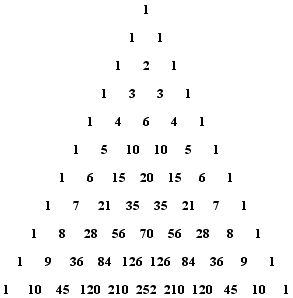Question #ea843
1 Answer
Explanation:
To expand powers of a sum (or a difference), you can use Pascal's triangle:

The triangle must be read in this way: the first line represents the coefficient of the expansion of
The second line represents the coefficient of the expansion of
The thirdrepresents the coefficient of the expansion of
Now let's examine
And the powers will be
This means that we have that
In your case,
#a^6 = 729x^12# ;#6a^5b =1458x^10*(-1/x) = -1458x^9# ;#15a^4b^2 = 1215x^8*1/x^2 = 1215x^6# ;#20a^3b^3 = 540x^6 * (-1/x^3) = -540x^3# ;#15a^2b^4 = 135x^4 * 1/x^4 = 135# ;#6ab^5 = 18x^2 * (-1/x^5) = -18/x^3# ;#b^6 = 1/x^6#
Sum them up and you've got the solution.

